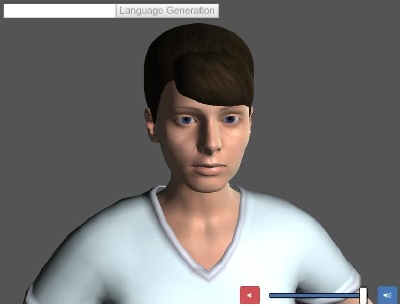KRISTINA - The first European virtual assistant in the field of healthcare already speaks Spanish, German and Polish
KRISTINA is a research project funded by the European Union, within the Horizon 2020 Program. The main goal of this project is to develop a technological solution to overcome migrants’ language and cultural barriers in healthcare and geriatric services in the host countries.
The project is coordinated by Leo Wanner, ICREA research professor of the Department of Information and Communication Technologies (DTIC) and nine project partners are contributing to the research: the Spanish Society of Family and Community Medicine – semFYC (Spain), the Eberhard Karls Universität of Tübingen (Germany), the Deutsches Rotes Kreuz (Germany), the Ausuburg University (Germany), the Centre for Research and Technology Hellas (Greece), Almende (Netherlands), the Ulm University (Germany), Vocapia Research (France), Universidad Pompeu Fabra (Spain)
The social challenge of this project has an increasing importance: different research areas are integrated to improve a real system able to overcome linguistic barriers for migrants looking for health assistance in Europe. Within the European funded project, KRISTINA, technical partners are constantly working in different research areas in order to ensure a natural conversation, improving the expressions and the ability to recognize and interpret emotions and human feelings. This first prototype demonstrates the current state-of-the-art in natural conversation and it can be considered as a working basis on which enhancements will be build.
According to eHealth Action Plan 2012-2020 on Innovative healthcare for the 21st century, presented by the European Commission, the market potential of eHealth is strong, despite the economic crisis: the global telemedicine market has grown from $9.8 billion in 2010 to $11.6 billion in 2011, and is expected to continue to expand to $27.3 billion in 2016. The European Commission's eHealth Action Plan 2012-2020 provides a roadmap to empower patients but also to link up devices and technologies, and to invest in research towards the personalized medicine of the future. This means providing smarter, safer and patient-centered health services: the EU project KRISTINA is working to fulfil this main objective and to ensure a real social impact of technology in the healthcare system.
The first prototype of a virtual assistant has been successfully tested

With the first prototype, KRISTINA becomes a conversation partner. The first prototype was presented in November 2016 in Tübingen (Germany) and will be used for testing in real situations in order to improve the prototype’s capacity for natural conversation. In the future, the assistant will be capable of holding a conversation by providing responses at colloquial speed, recognizing emotions in the voice, the face and body posture, as well as the cultural conditions of the person with whom it is talking and hold conversations in German, Spanish, Polish, Turkish and Arabic.
However, at the present stage, KRISTINA can only interact in German, Spanish and Polish responding to specific questions about health assistance, advising on specific health issues or reading some articles). One of the aspects on which most work has been done on this prototype is that the assistant will generate a natural language output voice for each response.
Leo Wanner, main responsible and coordinator of the KRISTINA project, ensures that the general objective of the first prototype has been achieved: users can conduct a basic dialogue with the system and this interaction is now supported by an overall structure that includes the interaction and the exchange of information between each system component. The first prototype was not expected to support a flexible dialogue but partners are now on the right track and they will continue to work, improving the functionalities and the quality of each individual technical component!
Web:
kristina-project.eu/en
Interview:
www.youtube.com
Social media:
Twitter Facebook
LinkedIn